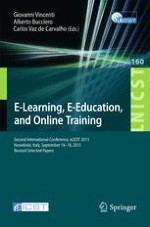2016 | OriginalPaper | Buchkapitel
Using Social Networking Tools for Teaching and Learning: A Perspective of University Lecturers and Students
verfasst von : Francis Otto, Shirley Williams, Karsten Øster Lundqvist
Erschienen in: E-Learning, E-Education, and Online Training
Aktivieren Sie unsere intelligente Suche, um passende Fachinhalte oder Patente zu finden.
Wählen Sie Textabschnitte aus um mit Künstlicher Intelligenz passenden Patente zu finden. powered by
Markieren Sie Textabschnitte, um KI-gestützt weitere passende Inhalte zu finden. powered by
